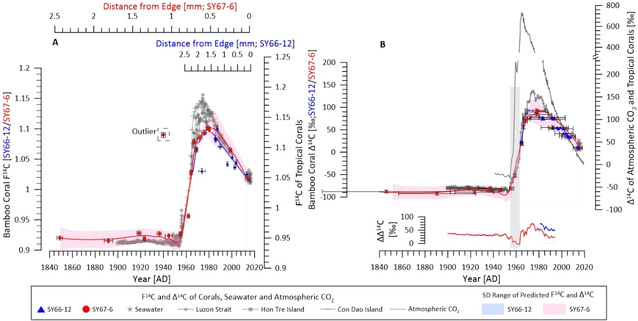Haozhuang Wanga, Xiaoli Zhoua, Haowen Danga, Les Watlinga, Zhimin Jiana
aState Key Laboratory of Marine Geology, Tongji University, Shanghai, China
Abstract: Growth rates of cold-water bamboo corals are of crucial importance for establishing high-resolution chronology and reconstructing the development of these corals. However, due to the difficulty of sampling, their ages and growth rates as well as ecological indications are still fragmentary. In this study, radiocarbon analysis was performed on live-collected bamboo corals from the South China Sea (SCS) to investigate their growth and the controlling environmental factors. The obtained bomb 14C curve of organic nodes, which is formed by corals via consuming the surface-sourced sinking particulate organic material suggest that the organic nodes can document the upper ocean environmental conditions. The corals with ages up to 829 years have radial growth rates (RGRs) of 7.4–60.0 μm/year (average: 22.9 μm/year). These RGRs are among the lowest values of all the published RGRs of bamboo corals, representing the slow growth of corals in the SCS, and probably results from the low surface productivity. On the other hand, the relatively high coral RGRs at water depths of ∼1000 m and ∼2000 m probably results from the enhanced food availability caused by the strong bottom current at the water mass boundaries in the intermediate and deep waters. Although no significant correlation between the coral RGRs and the ambient environmental conditions were found, the relatively low RGRs of bamboo corals in the SCS clearly imply rather low ability to recover after damage. Further investigation of the environmental conditions controlling the growth of bamboo corals is needed.
Full Article: https://www.sciencedirect.com/science/article/pii/S0967063724000931



